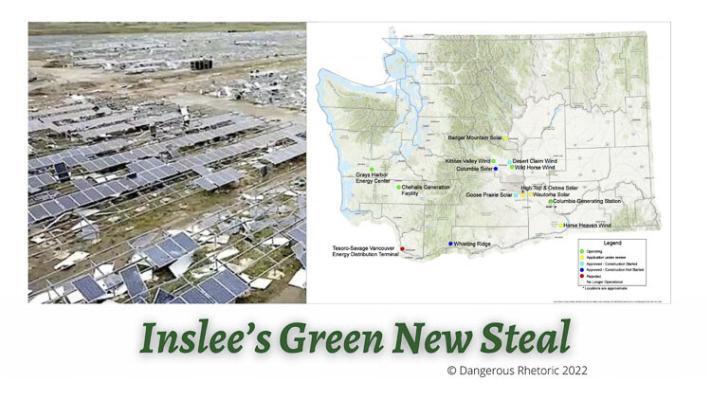
In her weekly column, Nancy Churchill states that ‘our state’s Democratic leaders only care about the environment when it can be used to transfer wealth from the taxpayers into their pet projects’
Nancy Churchill
Dangerous Rhetoric
For years in Washington state, environmentalists have been able to shut down development just about anywhere they wanted. They used the spotted owl to shut down our vibrant logging industry. They used the Growth Management Act to control industrial and urban development in nearly every county. They didn’t care one bit about local control and planning authorities or about the rights of property owners.

However, environmental nonprofits and conservation groups are having very little luck in stopping the land grab justified by Governor Inslee’s goal to reach net-zero greenhouse gas emissions by 2050. Unfortunately, our state’s Democratic leaders only care about the environment when it can be used to transfer wealth from the taxpayers into their pet projects. Democratic legislators are enabling Governor Inslee’s mad rush to cash in on federal funding for solar and wind energy projects.
The governor is encouraging industrial solar farm projects that will cause the destruction of valuable habitat for rare birds like the Douglas County sage grouse and that will destroy wetlands in other counties. In addition, thousands of acres of valuable farmland would also be stripped of topsoil, paved with concrete and covered with solar panels which can leach toxic chemicals. These projects would also have massive banks of batteries which might spark extra-hot fires.
Who or What is EFSEC?
The Energy Facility Site Evaluation Council is made up mostly of Inslee administration officials from various state agencies. EFSEC coordinates all evaluation and licensing steps for siting certain energy facilities in Washington.
This council runs roughshod over the recommendations of the Department of Fish and Wildlife, the Department of Ecology, and nonprofit conservancy groups. Appeals from county commissioners in Yakima, Douglas and Benton counties, which are bound by the Growth Management Act to preserve farmland, are likewise ignored.
The members of EFSEC believe they can ignore the Growth Management Act, local zoning laws and county moratoriums: “Developers can bypass counties by applying to the state council … The council set a precedent in 2017 by disregarding a moratorium adopted by Kittitas County … Despite the moratorium, the state council recommended a solar plant on farmland. Gov. Jay Inslee approved the project.”
In a 2008 decision by the Washington Supreme Court in Kittitas Turbines v. EFSEC, the court ruled the Growth Management Act takes a backseat to siting energy projects. With this decision, the State Supreme Court trampled on the principal of local control by elected officials. Now, Governor Inslee is calling for the Legislature to enact additional new laws to push through energy projects even more rapidly. So much for local control, the Growth Management Act, or environmental concerns!
Environmental problems caused by Solar Farms
Some would argue the urgency of reducing carbon emissions to “save the planet” would trump all other problems. However, industrial solar projects also cause quite a bit of harm to the environment. Does it make sense to harm the environment to save the environment? Environmental and conservation groups should fight this insane rush to throw the baby out with the bathwater.
At the top of my list of environmental problems caused by industrial solar is the destruction of agricultural land and habitat. When an industrial solar site is developed, several feet of topsoil is stripped off the site. If the solar project is abandoned at a later date, the damage to the soil can never be repaired or recovered. Topsoil is literally priceless.
Drainage and runoff are other significant environmental problems. If you think a paved parking lot is bad, imagine the runoff that would come from 10,000+ acres of paved ground, solar panels and batteries! This runoff would have to be diverted, managed, and tested for contaminants—a significant cost to the community. It’s also possible that toxic chemicals would leach into the water table and contaminate water supplies.
Finally, disposal and decommissioning is a challenge. Solar projects contain toxic and hazardous materials which cannot be recycled. The potential cost to clean up the site is often more than the cost of the initial investment. Many times, local governments and taxpayers would be on the hook for the cost of clean up. Republican Senators Call for Common Sense Solutions
I hope my environmentally-minded friends all across the political spectrum will consider supporting the new “Power Washington” plan recently released by Republican Senators King, Short and Braun. This plan outlines sensible solutions that would keep our lights on and energy costs down. One aspect of this proposal would “Ensure that the transition to new energy technology is environmentally responsible,” and the plan includes restoring local control and environmental oversight to the process of energy project siting.
If we really want to save the environment, we will have to loudly ask the Legislature to restore the right for local and environmental oversight on the site locations for industrial solar and wind projects.
Nancy Churchill is the state committeewoman for the Ferry County Republican Party. She may be reached at DangerousRhetoric@pm.me. The opinions expressed in Dangerous Rhetoric are her own.
Also read:
- POLL: Why did voters reject all three tax proposals in the April 22 special election?Clark County voters rejected all three tax measures on the April 22 special election ballot, prompting questions about trust, affordability, and communication.
- Opinion: The war on parental rightsNancy Churchill argues that Olympia lawmakers are undermining voter-approved parental rights by rewriting key legislation and silencing dissent.
- Opinion: An Earth Day Lesson – Last year’s biggest environmental victories came from free marketsTodd Myers argues that Earth Day should highlight free-market solutions and grassroots innovation as more effective tools for environmental stewardship than top-down mandates.
- Opinion: Time to limit emergency clauses and give voters a choiceTodd Myers urges the governor to remove emergency clauses from bills that appear intended to block voter input rather than address real emergencies.
- Letter: C-TRAN Board improper meeting conductCamas resident Rick Vermeers criticizes the C-TRAN Board for misusing parliamentary procedure during a controversial vote on light rail.










